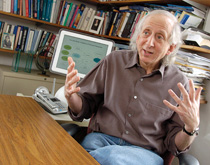
We become academics because we are fascinated with how some part of the world works. However, we live with our colleagues and not with the world. As a result, academic life always risks drifting off into directions defined by our collective taste, rather than by their actual importance.
Calamities give pause to wonder what we have learned that is worth knowing. This winter’s earthquake in Haiti is such a calamity. What can my field, decision science, offer? Perhaps we can provide some insight into why the tragedy is so hard to comprehend—and provide some help, too, if we draw on other disciplines.
Based on decision science research, the tragedy's scope, complexity, and intensity challenge our comprehension.
The scope:
Soon after the earthquake, I heard a complaint about "86 tons of emergency food, just sitting in El Salvador." That sounded huge. However, decision science finds that we often have faulty intuitions for big numbers. Our engineering colleagues teach us to discipline those intuitions with back-of-the-envelope calculations. If people need, say, two pounds of food a day, then the El Salvador stock would only feed about three percent of Port-au-Prince's three million residents for a day. If people need five pounds a day of all supplies (food, fuel, medicine, etc.), bringing them by air means, roughly, a cargo 747 landing, unloading, and taking off every 15 minutes until the port is reopened.
The complexity:
We watch the news, asking how well Haitians and their helpers are coping. However, decision science finds that we often overestimate others' ability to shape their world, at times expecting them to do the impossible. Our colleagues in the humanities teach us to discipline those intuitions by examining the details of related situations. The Berlin Airlift fully supplied two million people for 10 months. Even with the material and experience of World War II, it took time and tragedy to get it right. The airlift succeeded with an urban population in a ruined city under military occupation. It had to devote 65% of its capacity to coal. It chose to support Operation Little Vittles, bringing candy to German children. Solutions for Haiti must be similarly sensitive to the fabric of its social life.
The intensity:
Haiti draws us because there is so much to do. However, decision research finds that having too many options can produce ineffective choices. Our colleagues in the other social sciences teach us to discipline those intuitions by learning how things work. That seems easier with programs helping individuals, like the orphan airlift to Pittsburgh, than with programs that strengthen their society. Unless social programs earn our trust, then we may address the parts but not the whole of Haiti's needs.
This reality check left me feeling that my discipline can make a small contribution to this vast problem—if it works with others. Much more than most universities, Carnegie Mellon encourages its disciplines not to go it alone. It’s up to us to use that opportunity.
—Baruch Fischhoff
Baruch Fischhoff is Howard Heinz University Professor in the Departments of Engineering and Public Policy and of Social and Decision Sciences, where he heads the university’s unique Decision Science major. He is a member of the Institute of Medicine and chairs the Food and Drug Administration’s Risk Communication Advisory Committee and the National Research Council’s Committee on Social and Behavioral Science Contribution to Intelligence Analysis. On the subject of the Haiti earthquake, he recently coauthored an op-ed essay that appeared on CNN.com.



